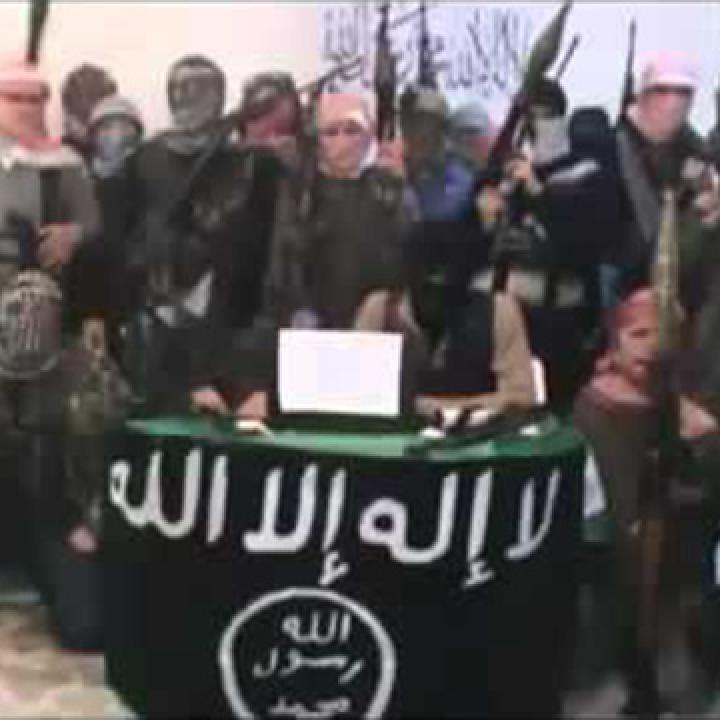

If the American-Russian diplomatic process permanently fails, Syria could be on the brink of becoming the epicenter of international jihadism.
November 9, 2016
If the American-Russian diplomatic process permanently fails, Syria could be on the brink of becoming the epicenter of international jihadism. The neverending Battle of Aleppo is re-creating miserable scenes of bitter conflict never seen since World War II, and as a result it appears that some Sunni citizens on economic life support are embracing hardline Islam as a form of survival. Recently, a low-key anti-jihadist news website "revealed" photos of east Aleppo residents holding up pro-Jabhat Fatah al-Sham and anti-UN signs during a small demonstration outside a UN aid convoy. The pro-Nusra narrative fits previous reports of jihadists "transparently" distributing meager rations in order to win the support of starving citizens.
The next indication of rampant radicalism is the sudden emergence of child soldiers on all fronts of the conflict. In April of 2016, the United Nations Office of the SRSG Children and Armed Conflict published a scathing report underscoring the plight of Syrian children. The report claims that nearly every faction participating in the Syrian civil war recruits child soldiers, and remarkably, the two most "moderate" factions – the Syrian Arab Army and Free Syrian Army - are accused of recruiting seven-year-olds to fight on the front lines. If that is not grim enough, the SRSG also documented that in the span of just twelve months adolescent conscription has increased by twenty percent. Young Syrians could represent the future of an even more violent and destructive form of international jihadism, leading to the next major threat to Syria's existence as a civil state. A decisive Russian-Syrian victory in the battle of Aleppo could compel Western-backed rebels to give up on international sponsors who have failed to deliver on their promises of bringing the regime to the negotiating table. Any rift between Western countries and moderate rebels could play into the hands of jihadist groups that have previously capitalized on opportunities to recruit and radicalize beleaguered secular fighters. And in rare public spat with the United States, Khalid Khoja, a chief member of the opposition High Negotiations Committee (HNC), blamed the U.S. for failing to provide precise offensive weaponry to change the balance of power in Aleppo.
Russia’s plan for eradicating extremists from Syria – pressuring the United States to decimate al-Qaeda foot soldiers - would play into the hands of both extremists and the Syrian regime, keen on drawing the United States into a quagmire. Yet despite high stakes and the explosiveness of the Syrian conflict, the Obama administration has downplayed the geostrategic importance of Syria, arguing that only an elusive “political solution” can bring an end to the conflict. This alibi of ignoring the magnitude of the conflict may have sufficed years ago, however the immediate results of the war – international terrorism and the emergence of al Qaeda in Syria - underscore the need for comprehensive American involvement. Nonetheless, unilateral action taken by only one player in the multi-sided conflict could be detrimental in the long run. The United States must use its influence to persuade international players to recalibrate their respective involvement in the war by committing peacekeepers to future buffer zones separating the various factions. The presence of a multinational peacekeeping force would be a monumental deterrent to all sides.
The next administration ought to get tougher on Russia, Iran, and the Syrian regime to prevent Syria from becoming a safe haven for international jihadists. Defense officials have warned that intervening in the conflict could put American fighter jets at risk; however it is nearly certain that Russian and Syrian forces would not risk war with the United States over areas of Syria that are already depopulated and destroyed.
The United States must take a methodical approach, carefully asserting American influence vis-a-vis Turkish interlocutors that have good ties with Syrian opposition fighters. The first step in securing safe havens Syria is liquidating the leadership of jihadists groups and offering foot soldiers the opportunity to join more moderate factions in exchange for “political” support. By some estimates, the majority of fighters belonging to Jabhat Fatah al-Sham, Jund Al Aqsa, and even the Islamic State do not subscribe to radical Islam and in fact typically joined jihadists to take advantage of a higher rate of pay, advanced weaponry, and better living accommodations. Gradually uniting the opposition on the ground under the banner of the United States, Turkey, and the international coalition would send a clear message to Syria, Russia, and Iran that continued intransigence in the political process will inevitably destroy the Syrian regime.
Assuming continued political posturing on the part of the Syrian regime, the United States and its allies should allow the reconfigured opposition to establish governance on the Syrian-Turkish frontier. The presence of a rival government coupled with enhanced sanctions may force the regime to finally negotiate in good faith. Some Experts on the conflict have proposed the idea of using foreign troops to secure future “autonomous zones” but this could be nearly impossible without first reconciling or at least deconflicting the diverse factions participating in the conflict. An alternative strategy proposes using the most moderate rebels to form independent counterterrorism units to protect and defend predominantly Sunni areas, prompting one to ask if the time has come for the US and its allies to begin vetting, training, and enlisting for this mission the rebels that they are already arming. These steps could represent Syria’s best hope for averting a future characterized by kamikaze jihadists hell-bent on destroying the West. At the same time, it will be essential somehow to reassure Israel, Iran, and other Middle Eastern players that even if the opposition gathers new strength, the new Syria will not become a Sunni rogue state. This will be a delicate balancing act at best, but the likely alternative – an endless jihadi and refugee breeding ground bordering some of our closest allies – is even worse.


